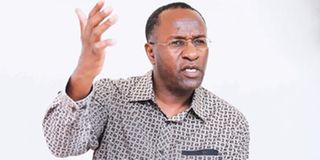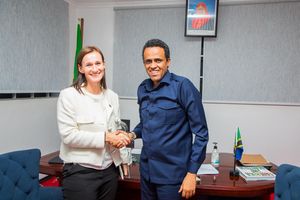Corruption 'a right' in Tanzania, claims retired PS

Retired Permanent Secretary Patrick Rutabanzibwa argues that in Tanzania, civil servant have learnt to expect the greasing of palms, without which nothing gets done. PHOTO | FILE
What you need to know:
- “To slay this dragon, we have to change our attitudes and start demanding that things are done in the right way right from the grassroots,” argues Mr Rutabanzibwa.
Dar es Salaam. Corruption is so rampant in the country that it has become a “right” for which some people are ready to kill, according to retired Permanent Secretary Patrick Rutabanzibwa.
He wants the growing culture of impunity among public servants brought to a halt.
“To slay this dragon, we have to change our attitudes and start demanding that things are done in the right way right from the grassroots,” Mr Rutabanzibwa, who has served in top government positions for more than 30 years, told The Citizen on Sunday in an exclusive interview.
“It is not enough for a few people to fight from the top. Tanzanians must now resolve to take popular action to confront the vice themselves.”
Mr Rutabanzibwa spoke candidly on a wide range of issues just over a week after he voluntarily retired from the civil service, which he joined in 1980 as a junior field researcher. He built a reputation over the years as a no-nonsense and incorruptible administrator.
He worked as a PS for 16 years and ended his career at the corruption-ridden ministry of Lands, saying he feared corruption could get worse if rubust action was not taken to correct the situation.
He added: “I was still young when Mwalimu (former president, Julius Nyerere) was our leader. Then, that visible strictness against corruption was seen clearly. Those in the bureaucracy thought twice before dipping their fingers in the cookie jar, but the fear has since diminished.”
A sense of impunity has set in, he added, in the absence of high profile corruption cases that would remind the people of dire consequences.
Morever, the people have not taken advantage of the prevailing political and governance systems to push the war further.
“If the government is subjected to enough pressure on certain things, it can act sometimes,” he said. “The public needs to get to a critical point and say ‘enough is enough’ and demand action.”
He confessed to having been the target of corruption beneficiaries when he tried to seal the loopholes they used to channel their loot.
He further disclosed that he received death threats from a syndicate of land grabbers that he dismantled.
“The hatred is more intense than that of a person who is denied his or her right,” he said. “This is an amazing phenomenon.”
The former PS admitted to having seen “real small and big corruption” in the ministry of lands.
“It has reached a point where it is seen as a right. People no longer fear.” It is believed that all the presidents Mr Rutabanzibwa worked under placed him in tough dockets to uproot the vice.
He has worked under all four administrations and under 14 different ministers.
Integrity
According to Mr Rutabanzibwa, lack of integrity and bureaucracy in the Civil Service stands in the way of Tanzania’s efforts to develop.
They have also raised the cost of living for the majority poor. “Integrity is not confined to corruption only but there is an element of this in our systems themselves,” he said.
Gross violation of public service ethics and negligence are yet more big problems.
“We stopped holding each other to account many years back. It is very rare today to hear someone has been disciplined and the outcome made public. What we do is transfer them.” He stood up to some politicians, he added, “but with an explanation that they understood”.
Incompetence
Mr Rutabanzibwa touched on concerns that the level of competence among public servants was on the decline and attributed this to structural adjustment programmes that saw many years of stagnation in human resource and skills development.
“Many of us are retiring without leaving behind capable enough replacements across the board,” he added.
Mr Rutabanzibwa, who has a strong educational background, said it was time authorities fixed the education system.
He added: “We are in a crisis because our education today does not create critical thinkers, but there is enough talent in the public and private sectors to tap into to chart a better system for future generations.”
Elections
Mr Rutabanzibwa also warned of a vicious circle in the way the country handles politics. “I see the major focus put on issues that are tied to a five-year election cycle at the expense of long term interests that outlive the political parties and political personalities.”




